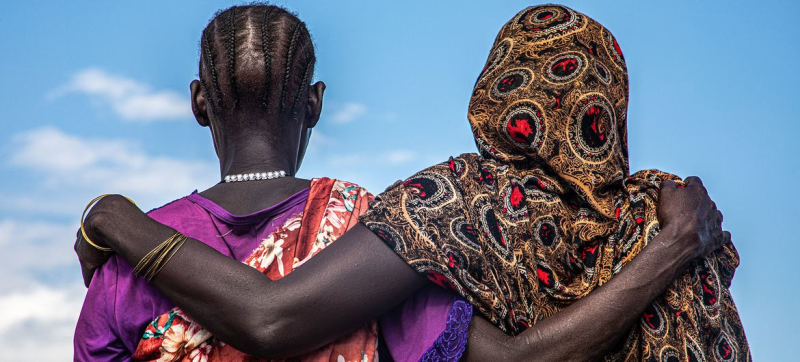- Bangladesh Bank Buys $115 Million to Support Forex Market |
- Tarique Rahman, Daughter Zaima Added to Voter List |
- NCP and LDP Join Jamaat-Led Eight-Party Alliance |
- Tarique Rahman’s gratitude to people for welcoming him on his return |
- Attorney General Md Asaduzzaman resigns to contest election |
UN Warns South Sudan Risks Return to Full-Scale War

South Sudanese women share a safe space set aside for them at a camp for internally displaced people in Bentiu.
South Sudan faces a renewed slide into full-scale conflict unless urgent international action is taken, the UN-appointed independent investigative body examining human rights in the country warned on Wednesday.
Addressing the UN General Assembly, the Commission on Human Rights in South Sudan highlighted escalating armed clashes, political detentions, and widespread human rights violations, calling for coordinated efforts to protect civilians and uphold justice.
“South Sudan’s political transition is falling apart,” Commissioner Barney Afako told the Assembly. “The ceasefire is not holding, political detentions have become a tool of repression, key provisions of the peace agreement are being systematically violated, and Government forces are using aerial bombardments in civilian areas. All indicators point to a slide back toward another deadly war.”
Fighting intensifies
The Commission noted that fighting has intensified since March, displacing over 370,000 civilians internally and forcing many more to flee to neighbouring countries.
Across South Sudan, nearly 2.6 million people remain displaced, in addition to around 600,000 refugees—mostly from Sudan.
“The suffering of South Sudan’s people is not collateral damage; it is the direct consequence of political failure,” said Commission Chair Yasmin Sooka.
“Once again, civilians are being bombarded, women are being raped, children are being displaced and forcibly recruited into combat roles, and entire communities are living in fear. This is a tragic repetition of South Sudan’s painful past. This war on the people of South Sudan is man-made and preventable.”
Investigators highlighted the growing complexity of the conflict, with political power struggles intertwined with ethnic tensions and local grievances.
Government reshuffles and partisan appointments have deepened mistrust among the signatories to the 2018 Revitalized Peace Agreement, while localised fighting continues to be exploited for political and military gain.
Billions extracted ‘while the population starves’
Commissioner Carlos Castresana Fernández linked the crisis to corruption: “Billions in oil revenues have been siphoned off while the population starves. Hospitals have no medicines, schools have no teachers, and soldiers go unpaid while elites enrich themselves through opaque contracts and off-budget deals. Corruption is not a side effect of the conflict — it is one of its engines.”
The Commission’s report also details ongoing sexual violence, forced recruitment of children, and extrajudicial killings, with national authorities complicit in some cases.
Institutions responsible for upholding the rule of law remain underfunded, while promises to reform detention powers have largely gone unfulfilled.
The investigators called on the UN, African Union, and regional partners to ensure accountability, expedite the establishment of the Hybrid Court for South Sudan, and engage political leaders in an inclusive peace process.
‘Handshakes not enough’
“Peace will not come through words or handshakes,” Sooka said. “It will come through concrete actions — ending impunity, protecting civilians, and building institutions that serve people, not power. Justice and accountability must not remain deferred promises. The international community must move beyond expressions of concern to coordinated action. Otherwise, the suffering will only intensify.”
The Commission on Human Rights in South Sudan, established by the UN Human Rights Council in 2016, is an independent body mandated to investigate human rights violations in the country. Its mandate has been renewed annually, and its members serve without receiving any salary.

